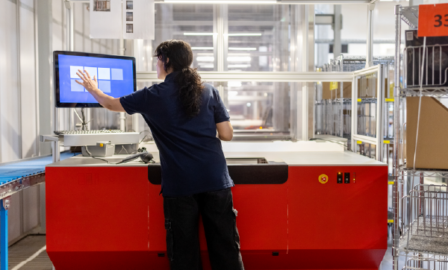What Supply Chain Consultants are Advising about Artificial Intelligence, Blockchain, and Robotics
Many supply chain consulting companies are looking at technology advancements like Artificial Intelligence (AI) and Blockchain and advising their clients that these innovations won’t be significantly impacting most manufacturers in the near term. Although many of these new technologies won’t be transforming the entire world’s supply chain in the next 1-3 years, the competitive nature of the industry requires consumer products executives to get started with their proof of concept projects now. Clarkston Consulting’s supply chain consultants are encouraging our clients to look at their peers in finance, marketing, and research and development who are already using machine learning now to build a competitive advantage tomorrow. The opportunity to leverage these technology advancements throughout the supply chain is enormous, and operations executives need to get started.
Amazon, Google, Microsoft, and others have a variety of technology applications for artificial intelligence that they have been selling to other businesses for several years. IBM’s Watson has been at the forefront of finding ways that AI can improve collaboration, information sharing, learning and decision -making effectiveness, particularly in the marketing and customer service space. In late 2016, Amazon launched artificial intelligence technology to their cloud offerings which contained image recognition, a speech-to-text service, and tools for building apps. Google and Microsoft have made a fortune using their digital advancements like machine learning to predict user’s online behaviors.
Recently, SAP has joined their ranks with the release of SAP Leonardo, their digital innovation system. For consumer products companies that are already running SAP systems, this presents an interesting dynamic and valuable opportunity. Now, companies can easily start proof-of-concept (POC) projects that are integrated into their core business operations. Our supply chain consultants are advising our clients to start piloting and experimenting now so that they have the internal skills and learnings when these new technologies become mainstream. With large installed SAP infrastructures, many consumer products companies can further automate tasks using machine learning techniques, gain faster insights from greater volumes of data faster with predictive analytics from big data, and continue to strive for more responsive, agile, and nimble customer-facing supply chains, while extremely efficient downstream.
Supply chain proof-of-concept projects for AI
The first question for any consumer products company looking to start a digital transformation in their supply chain organization is related to key points of differentiation. What combination of speed-to-market, efficiency, quality, and product value sets your company apart from your competitors? As a food company, you might look for a centralized hub for IoT and blockchain data to ensure safe and high quality foods for your consumers. As an advanced manufacturer, you might differentiate from your competitors on your ability to build personalized, rapidly developed new products. The impact of a digital transformation is extremely broad.
Once you assess and determine your most critical differentiator from a supply chain perspective, the next question is about which technology innovations to incorporate into your pilot.
- Will big data analytics skills and experience set your team up for success?
- Can the internet of things (IoT) change the way you process customer orders and shipments?
- Are robotics and machine learning technology able to repurpose your workforce to greater value-added tasks?
Although our supply chain consultants may not agree on the timing of when these technologies will impact your function, there is significant evidence to show disruption is already happening at your organization in the way you operate with customers, consumers, and shoppers. If you aren’t meeting as a supply chain leadership team several times per year to talk about these opportunities, and related investments, you should know that your competitors are doing so. Start sending your high-performing supply chain leaders to technology conferences and request that supply chain experts and technology experts come in to speak with you about the latest innovations and applications of these technologies in the consumer products industry. Making some small investments today can be the difference between success and failure in a few short years. The opportunities are real, they exist, and some of your competitors are acting upon them; it requires focused pilot programs with specific applications for it to be successful, scalable, and sustainable.
If you found this information interesting, subscribe to our blog to receive our consumer products insights:
Subscribe to Clarkston's Insights



